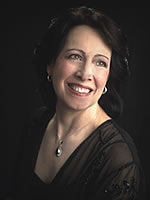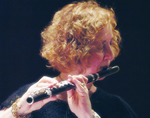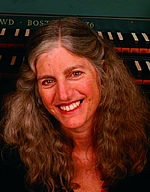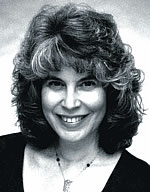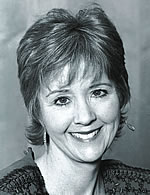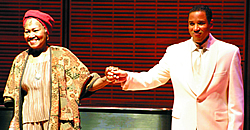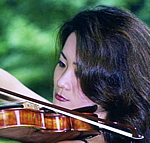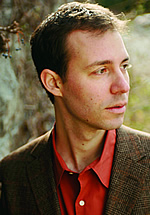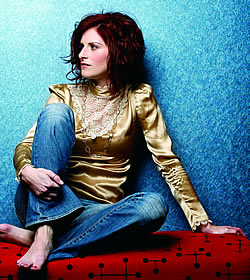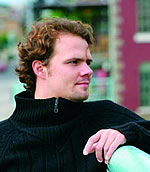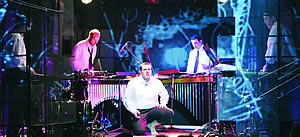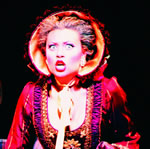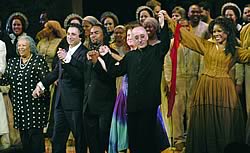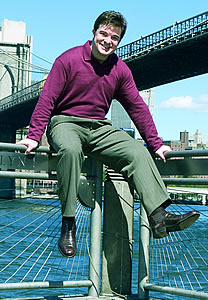
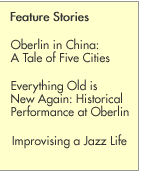 |
|
Home :: Alumni Notes Alumni Notes :: Notes Four ways to share your news 1950s Retirement has been anything but dull for Aldo Mancinelli ’52, who became the first American to win the coveted Ferruccio Busoni International Piano Competition in 1954. Last year, he taught for a week at Pittsburgh State University and gave 11 concerts in 6 states; under the sponsorship of the European Piano Teachers Association he gave 3 concerts and a lecture in the Czech Republic. During his career, Aldo has played nearly 1,000 concerts on four continents. Warner Jepson ’53 has received several inquiries from people who are fascinated with his compositions, San Francisco’s Burning and TOTENTANZ in particular. San Francisco’s Burning was commissioned by the San Francisco Playhouse in 1960. When it opened, a reviewer with the San Francisco Chronicle wrote: “It is an extremely rich and imaginative ballad opera . . . it is bold and satisfying, amazingly various and diverting, and very highly recommended.” Another piece, the electronic composition TOTENTANZ, was commissioned by the San Francisco Ballet in 1967; after its original run the show was produced annually well into the 1980s in Nob Hill’s Grace Cathedral. Rita Loving ’56 is musical director of Corso Estivo per Giovani Cantanti, an opera program for young singers sponsored by Scuola Italia, a language school in Urbania, Italy. Rita has served as a vocal coach and voice teacher in German and Dutch opera houses for more than 30 years; she recently retired from the Bayerische Staatsoper in Munich, where she was on the staff for 23 years. 1960s
In spring 2005, Sandra Carlock ’65 released a new CD, Piano Music by Edward McDowell, on London’s SOMM Recordings. A review in the August 2005 issue of Gramophone magazine said, “Such music requires a specially committed pianist and it would be difficult to imagine a more glowing or ardent champion than Sandra Carlock.” The CD, which earned Pianist Magazine’s “Pianist Recommended” stamp of approval, was featured on David Dubal’s series, Reflections from the Keyboard, on WQXR, the classical music radio station of the New York Times. Sandra was interviewed by John Brunning on Classic FM in London last summer and by Jill Pasternak last fall on WRTI-FM, the National Public Radio station of Temple University in Philadelphia. The latter broadcast also aired music from the disc during the hour-long interview. Besides recording and performing worldwide, Sandra teaches at the Settlement Music School in Philadelphia, where she holds the Arthur Judson Distinguished Faculty Chair in Piano. Over the years, many of Sandra’s students have gone on to graduate from Oberlin’s Conservatory. Information about Sandra’s activities and about ordering her CD is available on on her web site, www.sandracarlock.com. William Foster ’66 and his son, Daniel Foster ’91, were featured on the cover of the August 2005 issue of International Musician, the journal of the American Federation of Musicians. The father-son duo shares the first stand in the viola section at the National Symphony Orchestra in Washington, D.C. 1970s
1980s Law professor David Driesen ’80 continues to perform often, playing trumpet with the Syracuse University Brass Ensemble and the Excelsior Cornet Band, a small chamber group that performs music from the Civil War era on period instruments and in period garb. David says, “The instruments we play have gross intonation defects, which took some time to overcome. I really enjoy playing with the group because everybody listens carefully and follows each other instead of arguing.” In 2005, the group released its first CD, which is available at www.excelsiorcornetband.com. In February 2006, with the sponsorship of the Conservatory, Shawn Decker ’81 spoke on campus about his recent work, which involves a variety of physical and electronic media and combines music composition, the visual arts, and performance. Over the years, his work has evolved from primarily performance and tape-based music composition to installations intended for galleries or other spaces as well as interactive performance works that employ a variety of electronic media. Shawn’s work has been exhibited at art museums in Belgium, Finland, Japan, Sweden, the U.K., and the U.S. Shawn is a professor in the art and technology department and the sound department at the School of the Art Institute of Chicago. Sponsored by the Conservatory, Amy X Neuburg ’84 presented several classes, including a master class for TIMARA majors, and a performance on campus in April 2005. A resident of Oakland, California, she is an established figure in the Bay Area’s new-music scene. Amy’s “avant-cabaret” songs are diversely influenced, and in performance she accompanies herself with real-time looping and electronic drums. She has performed her solo work at clubs, theaters, festivals, schools, and museums throughout the U.S. As a vocalist, she has toured internationally with Robert Ashley’s contemporary opera ensemble, and she has amassed numerous composing and sound-designing credits for modern dance. Amy’s web site, www.isproductions.com/amy/, includes images, press quotes, and sound files. Recent performances by soprano Lisa Pierce ’87 include Queen of the Night from The Magic Flute with California’s Music from Bear Valley and with the Downtown Symphony in New York, N.Y., where she makes her home. Lisa was also featured as a soloist in Carmina Burana with the Putnam Chorale in Brewster, N.Y.
1990s In August 2005, pianist Kate Boyd ’91 began her first year as assistant professor of piano and director of piano studies at Butler University’s Jordan College of Fine Arts in Indianapolis. Before accepting the tenure-track position at Butler, she was an assistant professor of piano at Heidelberg College in Ohio. Kate, who studied with professor of piano Sedmara Rutstein at Oberlin, was among the top 12 finalists in the 2005 Iowa Piano Competition.
In May 2004, composer Keeril Makan ’94 received a commission from John Harbison and Dawn Upshaw, who were pairing four young composers with four young singers to create original pieces for a workshop at Carnegie Hall’s Weill Music Institute. Keeril’s piece turned serendipitously into an almost all-Obie event: His composition, Target, was a setting of poetry by Jena Osman ’85, and he was paired with mezzo-soprano Laurie Rubin ’01. Jeff Lunden ’80 of National Public Radio followed Keeril and Laurie throughout the collaboration and rehearsals that resulted in Target’s premiere in October 2004 at Carnegie Hall; his report aired on NPR’s Weekend Edition a week later. Keeril is assistant professor of composition and music theory at the University of Illinois School of Music. In February 2005, Meredith Cooper ’97 was appointed executive director at the New School of Music (NSM) in Cambridge, Mass., after serving as interim executive director for nine months. NSM is a nonprofit community music school for children and adults of all ages and levels. Meredith also teaches a course at the school on improvisational music techniques. Visit NSM’s web site at www.newschoolofmusic.org and Meredith’s site at www.meredithcooper.com. In November 2004, the Florida Department of State and Division of Cultural Affairs awarded pianist Pia Bose ’98 an artist enhancement grant for professional development. Pia lives in Geneva, where she is a candidate for the Diplôme de Soliste at the Conservatoire Supérieur et Académie de Musique Tibor Varga, in the class of Dominique Weber. In 2004, Pia presented solo recitals at various locations, including the Palais de l’Athénée (Salle des Abeilles) in Geneva and the Chapelle in Sion. In 2005, she performed at Geneva’s International Red Cross/Red Crescent Museum and at the city’s Fête de la Musique. Other engagements included solo recitals in Chamonix, France, and Malag, Spain. Flutist Amara “Amy” Guitry ’98 visited campus in February 2006, when she and fellow flutist Stephen Preston gave a concert and conducted a master class. Their visit was sponsored by the Conservatory. The duo’s concert presentation was titled “There and Back Again, or the Baroque Flute: A Journey from the 18th to the 21st Century” and featured new compositions by living composers as well as pieces by baroque-era composers. Amy’s work researching and developing new techniques for the baroque flute is highlighted in the electro-acoustic composition Less, written for her by Jo Thomas in 2004. Amy performs as a freelance musician, gives lectures and recitals about her work, and teaches at the Wildacres Flute Retreat in North Carolina.
2000s Lydia Steier ’00 completed a remount of Barrie Kosky’s Komische Oper production of Gyorgi Ligeti’s Le Grand Macabre. The production premiered May 7, 2006, at the Grazer Oper in Graz, Austria. This summer, Lydia is moving from Berlin to Stuttgart, Germany, where she will work as staff stage director at the Stuttgart Staatsoper. “Everyone (who wants to) can keep up with me at www.lydiasteier.blogs.friendster.com,” she says. Esther Criscuola de Laix ’01 won the Society for 17th-Century Music’s 2005 Irene Alm Memorial Prize for her paper, “Culture and Ceremony in the Wedding Motets of Jacob Praetorius.” The prize is awarded annually for a scholarly presentation or lecture-demonstration given by a student at the society’s annual spring conference. Esther is a doctoral candidate in the department of music at the University of California. All but one of the tracks on Mostly Other People Do the Killing, the new self-titled CD by bassist-composer Matthew “Moppa” Elliott ’01 and his jazz quartet, are compositions by Moppa. In a review appearing in the July 13, 2005, issue of Time Out New York, Hank Shteamer wrote: “Elliott has wisely populated his band with virtuosos who love to play it rough. The leader’s catchy tunes . . . serve as perfect launch pads for the group.” A review in the May 2005 issue of All About Jazz-New York stated: “Moppa Elliott is a young bassist leading a young, talented band. As such the music ... is misleadingly mature. It’s heartening to see such talent continue to flow into jazz ... .” The group includes Peter Evans ’03 on trumpet. In June 2006, mezzo-soprano Laurie Rubin ’01 gave a debut recital at London’s Wigmore Hall. In 2005 she released a CD of art songs, Faith in Spring. In 2004, she was chosen by Dawn Upshaw and John Harbison to be one of the four singers and four composers taking part in their workshop at Carnegie Hall’s Weill Music Institute. Laurie was paired with composer Keeril Makan ’94, whose work, Target, was based on the poetry of another Oberlin graduate, Jena Osman ’85. The piece premiered at Carnegie Hall in October 2004.
Virginia Opera’s bass-baritone Frederick Jackson ’02 was asked to play the lead role during the final performance of Mozart’s The Marriage of Figaro at George Mason University’s Center for the Arts when the principal artist became ill. The opera’s assistant artistic director, Joe Walsh, says, “I heard Frederick sing . . . in a coaching session last season. I was very impressed by the strength of his voice and his flair for the role. It was a natural fit for him, so when we needed a cover for this production, I knew who to call.” Pianist Daniela Flonta ’03 won first prize and a special prize in the 2005 Campochiaro International Competition for Young Musicians held in Pedara, Italy. In 2004 and 2005, she won the Rislov Foundation Music Scholarship in Ann Arbor, Michigan. A native of Romania, Daniela moved in fall 2005 to Rome, where she is studying at the Accademia Internazionale di Musica. In March 2006, violinist Julia Sakharova ’03 made her New York solo recital debut at Steinway Hall, performing works by Strauss, J.S. Bach, and Tchaikovsky, as well as the world premiere of Ampersand, a new work commissioned from award-winning composer Sean Hickey. According to a review in Classical New Jersey Society, “Sakharova quickly proved herself an intelligent musician, whose solid technical facility remained second only to the astounding maturity of her interpretations.” Also in March, New York’s classical music radio station WQXR broadcast on the McGraw-Hill Companies’ Young Artists Showcase the recording of Julia’s October 2004 performance with the Juilliard Orchestra of Mendelssohn’s Violin Concerto; the concert was part of Julia’s prize for winning Juilliard’s Concerto Competition. In addition, Julia was named laureate of the Young Artists International Laureates Festival 2005 and subsequently toured as a member of the iPalpiti Chamber Orchestra throughout Europe. Thatcher Lyman ’04 has been named to the choral scholar post at York Minster, the largest gothic cathedral in northern Europe. His appointment there means that, with Sam Sytsma ’03, two of the five altos in the York Minster choir are recent Oberlin graduates. John Patrick Connolly ’05 has completed his first year as a Robert Gilleece Doctoral Fellow at the City University of New York’s Graduate Center, where he is research assistant to Bill Rothstein, a former Oberlin professor and one of the world’s foremost Schenkerian analysts. While at Oberlin, Patrick worked in this area with Professor of Music Theory Allen Cadwallader; now Patrick is helping compile the book Allen is editing: Schenker Studies 3, a collection of essays from the Third International Schenker Symposium. The first time Lance Libby ’05 entered a band in a competition, it won. “Not bad for a first-year director,” says Lance, who is completing his first year as band director at Horizon High School in Scottsdale, Ariz. Only 5 of the 20 bands competing in the 2005 Northern Arizona University Band Day received a superior rating. Lance’s band earned a superior rating with four captions—drum majors, auxiliary, percussion, and music performance. Margaret Garner and
the Oberlin Effect
Margaret Garner, a new opera that premiered in Detroit in May 2005 and has since traveled to Cincinnati, Philadelphia, and Charlotte, North Carolina, boasts a web of Oberlin connections, including composer Richard Danielpour ’78, soprano Denyce Graves ’85, hon. ’98, conductor Stefan Lano ’75, and dramaturge Nic Muni ’74. The librettist, Nobel Prize-winning novelist Toni Morrison, was awarded an Honorary Doctor of Humane Letters degree from Oberlin College in 1980. The opera, Danielpour’s first, is based on the true story of a fugitive slave who, when recaptured, murdered her children rather than see them returned to slavery. Her 1856 trial, held just blocks away from the Cincinnati Music Hall where the opera was performed in July 2005, was a landmark moment in American history: was the defendant guilty of theft, since slaves were considered property, or of murder? Lucy Stone, an 1847 Oberlin alumna and a prominent abolitionist, was a key speaker at the trial. Librettist Toni Morrison also based her novel Beloved on the story. The novel has supernatural elements, but the opera’s nightmare, despite a few liberties Morrison took with history, is a realistic one. Its direct, dramatic musical appeal has garnered critical acclaim and evoked a powerful audience response. Danielpour spent his “unforgettable” freshman year at Oberlin, during which he realized that composition, not piano, was his calling. At Oberlin he worked informally with Richard Hoffman and Joseph Wood before transferring to the New England Conservatory. Lano, a student of Hoffman and a senior that same year, had already had some success as a composer, and the two became friendly. Years later, Lano performed a Danielpour piece in Buenos Aires, where Lano is music director of the Teatro Colon. “I thought [Lano] would be a great person to be involved in Margaret Garner,” says Danielpour, “and when the time came to negotiate the contract, I stipulated that I got to choose the conductor.” The three co-commissioners agreed with his choice. Nic Muni, an Oberlin voice major and conducting minor who studied with Richard Miller, Robert Baustian, and Daniel Moe, became involved with Margaret Garner in 2002 when the Cincinnati Opera, of which he was then artistic director, became one of the opera’s commissioners. “I became a kind of unofficial dramaturge,” Muni says. “Richard was extremely open to discussion. I appreciated that—he could have said, ‘go jump in the lake.’” While working on the initial treatment for the opera, Danielpour saw Denyce Graves singing the title role in Carmen on PBS. “I knew right then that she was my Margaret,” he says, and approached her about the project. He was right, for Graves’ deeply felt portrayal has been the powerful core of the opera in every production. The mezzo-soprano went on to create the role of the Dragon in Eliot Goldenthal’s Grendel, directed by Julie Taymor ’74, which premiered at the Los Angeles Opera in May 2006 and was performed at the Lincoln Center Festival in July. Brooklyn Baton Passes
from Spano to Christie
Directing three major American musical institutions simultaneously leaves Michael Christie ’96 with a schedule he describes as “sophisticated but manageable.” And the young conductor says he couldn’t be happier. “I’m always hopping,” he says by phone from a Brooklyn hotel. “There’s never time to get mired in minutiae. And because the groups aren’t competing with each other, I can draw on my experiences with one to help the other.” Christie, a native of Buffalo, New York, says he’s especially pleased with his efforts at the Brooklyn Philharmonic, of which he was named director in August 2005. He took over the position from Robert Spano ’83, the much-respected music director of the Atlanta Symphony Orchestra. Christie’s programming of new and unusual works solidifies the Brooklyn Phil’s standing as what he calls “an alternative to the fixtures in the symphonic prototype.” “The emphasis of the Brooklyn Phil is on education, and that’s exactly the right direction. It’s more integrated into the community than you could ever imagine. We really matter to the people here.” Outside Brooklyn, Christie is music director of the Phoenix Symphony Orchestra, a larger institution with permanent players and a busier concert schedule, and of the Colorado Music Festival. He also appears regularly as a guest conductor with orchestras all over the world. In the U.S., he recently stood before the orchestras of Pittsburgh and St. Louis. Each ensemble he directs is unique, but Christie says his goal is the same everywhere. “I’m trying to put a human face back on this art form and create effective bridges between the orchestra and the community. In this field, you are so susceptible to the routine of performing. It’s incumbent on me to avoid routine, to keep the players firing on all cylinders all the time.” Christie learned how to do that during his Oberlin years. Not only was he a trumpet major, but he also studied conducting with Spano and Peter Jaffe ’78. Even though conducting came naturally to him, Christie says he looks back on his jam-packed school days and wonders how he survived. Also during this period, Christie spent critically important time with the Northern Ohio Youth Orchestras, a group of training ensembles based in Oberlin for which Professor of Music Education Joanne Erwin serves as artistic director and conductor. He says working with young players and their parents opened his eyes to the value of open, frank dialogue between musician and conductor. “It made me more aware of what people are balancing in reality. I think it made me a more sensitive and respectful leader. Oberlin gave me the chance to have those experiences, even as an undergraduate.” Christie’s big break came near the end of his Oberlin term, when a tape he sent to the prestigious Sibelius Conducting Competition won him a special prize for “outstanding potential.” The award led quickly to an apprenticeship at the Chicago Symphony Orchestra and to associate conductor positions with the Helsinki Philharmonic and Zurich Opera. Even though Christie is only in his early 30s, he says he doesn’t feel like his career is advancing too quickly. While he’s striving to improve his confidence and managerial skills, he knows he’s qualified for whatever job may be at hand. Having already made his stamp long ago, Christie says he’s entering “phase two” of his career. “I’m not the new guy on the block anymore. Now the question is, how am I going to grow as an artist?” |
